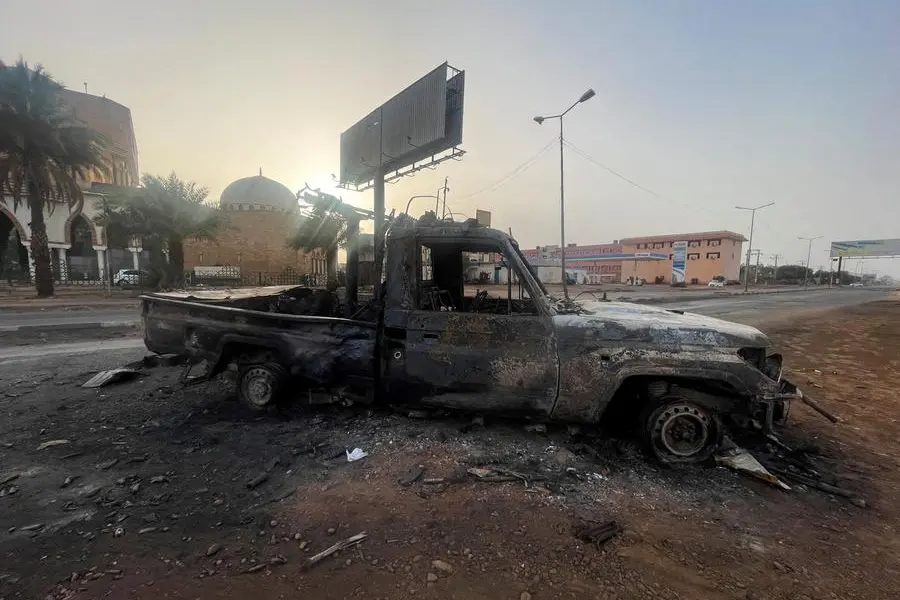PHOTO
CAIRO - Egypt on Thursday embarked on a fresh bid to halt fighting between Sudan's warring factions and contain the humanitarian crisis it has unleashed, using a summit of neighbouring states to try to revive international efforts to contain the war.
The leaders of Sudan's seven neighbours in a joint statement called on the warring parties to commit to a ceasefire, appealed to regional states not to interfere in the conflict, and agreed to facilitate delivery of aid.
They also warned of the possibility of Sudan's fragmentation or "descent into chaos that could lead to the spread of terrorism and organised crime" and called on the international community to meet aid pledges made last month.
Conflict between Sudan's army and paramilitary Rapid Support Forces (RSF) broke out in the capital Khartoum in April and has triggered a sharp surge of violence in the troubled Darfur region as well as fighting in North and South Kordofan and Blue Nile states.
More than 3 million people have been displaced, including 700,000 to neighbouring countries, most of which have been struggling with poverty and conflict. The United Nations has warned of a growing hunger crisis.
Using air strikes and artillery, the army has struggled to dislodge the RSF from positions across Khartoum.
The United States and Saudi Arabia had negotiated a series of ceasefires, but suspended talks in Jeddah after violations. Earlier this week, Ethiopia hosted a regional East African summit, but Sudan's army boycotted it, claiming lead sponsor Kenya was biased.
Priorities for Egypt, which has maintained close ties to Sudan's army, include reasserting itself on a file it feels excluded from by other regional efforts, and preventing cross-border support for the RSF, diplomats said.
Its plan aims to achieve a three-month ceasefire and open aid pathways by convening meetings with military and tribal leaders, taking advantage of long-term ties, two Egyptian security sources said.
"All of our brothers in Sudan must uphold the supreme interest and keep Sudan's politics and unity away from external interference that seeks to achieve narrow interests," Egyptian President Abdel Fattah al-Sisi told the summit.
DAM NEGOTIATIONS
Representatives of the RSF and Sudan's army did not appear at the summit. But Sudan's ruling council, headed by army chief Abdel Fattah al-Burhan, said it welcomed the outcomes and that the army was ready to stop fighting if the RSF halted attacks on civilian and government sites, and stopped blocking roads and looting.
Some of the leaders attending also said they welcomed the Egyptian initiative but hoped it could be coordinated with other diplomatic efforts.
Ethiopian Prime Minister Abiy Ahmed called for the Cairo and Jeddah processes to align with the regional IGAD initiative announced earlier this week.
"I would like to underline that such processes, including today's summit, need to align with the IGAD-laid, and African Union-supported, existing initiative," Abiy said.
Abiy could be seen in animated conversation with Sisi and other top Egyptian officials as a closed session of the summit began.
Speaking on Wednesday, U.N. special envoy Volker Perthes described mediation attempts as "emergency diplomacy", and said factions had used previous ceasefires to re-position.
"The two warring parties still think they can win the war so they accept diplomatic initiatives when they think it can help their aims," he said.
Relations between Egypt and Ethiopia, Sudan's two biggest neighbours, have been strained in recent years by a dispute over the giant dam Ethiopia has constructed on the Blue Nile.
But the two leaders met on Wednesday ahead of the summit, after Abiy last week said he would slow the fourth filling of the dam and ensure Sudan and Egypt received enough water, a conciliatory move.
After the summit, Egypt and Ethiopia issued a statement saying they would launch urgent negotiations to finalise an agreement on the dam within four months.
(Additional reporting by Nafisa Eltahir, and Ahmed Mohamed Hassan in Cairo, Nadine Awadalla, Nayera Abdallah, and Tala Ramadan in Dubai, Julia Payne in Brussels, Dawit Endeshaw in Addis Ababa and Bhargav Acharya in Johannesberg; writing by Nafisa Eltahir and Aidan Lewis; Editing by Alex Richardson, Conor Humphries and Nick Macfie)





















